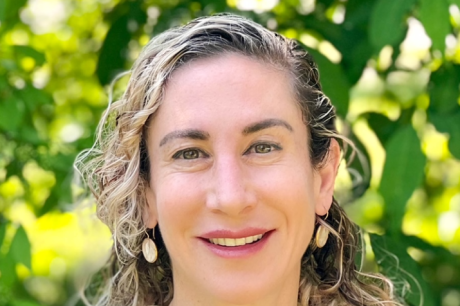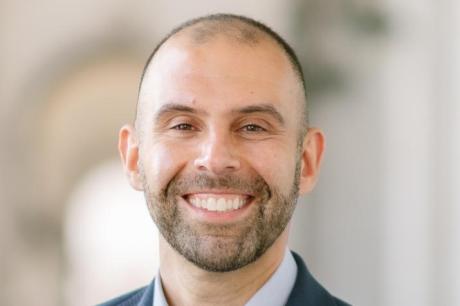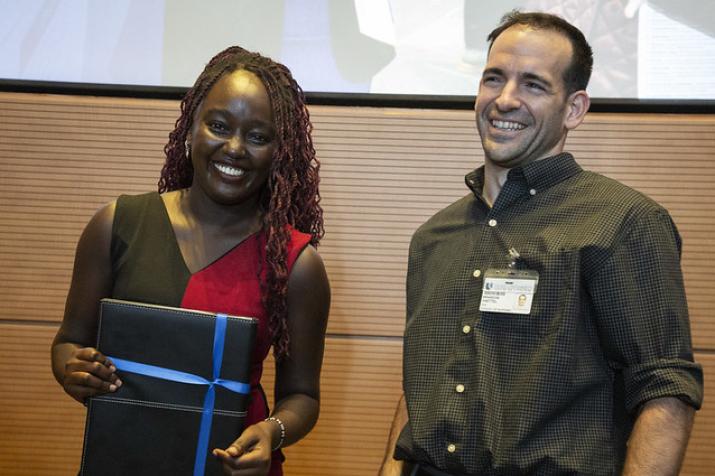
The author, MS-GH student Judith Mwobobia, and her mentor Brandon Knettel at DGHI's 2022 Research Showcase. Photo by Chris Hildreth/Rooster Media
Published November 22, 2022, last updated on November 29, 2022 under Education News
A good mentor can be essential to surviving the intense, highly individualized demands of graduate study. But what makes a mentoring relationship work? It’s about more than just imparting knowledge or directing students toward resources. Flexibility, compassion and some well-timed self-care can be as important to students’ success.
Judith Mwobobia, a second-year student in the Master of Science in Global Health (MS-GH) program, spoke with fellow DGHI master’s students and their mentors to find out what makes their partnership effective.
Make It Easy to Disagree
Mahgul Mansoor earned her MS-GH in May 2022 and is now a research assistant at Johns Hopkins Bloomberg School of Public Health. At DGHI, she was mentored by Eve Puffer, Ph.D., assistant professor of psychology and global health, on research involving mental health and family support interventions.
What do you think makes your partnership work so well?
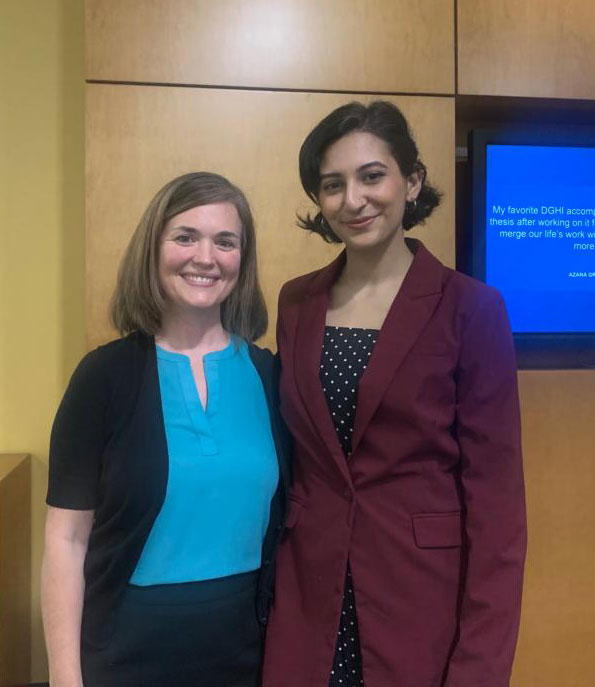
Mansoor: Eve is so humble and kind. I come from a background where the relationship between professor and student is marked by hierarchy. With Eve, I felt like I was treated like an equal. She encouraged me to speak up and share my thoughts and ideas. She has always trusted me and believed in me when I didn't believe in myself. She was the one who encouraged me to apply for the Dean’s Research award for master’s students and the Kenan Institute of Ethic’s GradEngage Fellowship -- both of which I was awarded. I would not have considered myself deserving if it wasn't for her. She sees your potential and pulls it out of you.
Puffer: Central to a positive mentor-mentee relationship is open and clear communication alongside a shared interest and dedication to the work. We met regularly to set goals and track progress, taking the work seriously while also allowing for flexibility and course corrections. Mahgul came to meetings prepared with updates, questions, and ideas. When there were problems, she came to me for troubleshooting, but she had already thought through possible solutions -that were often better than my own. Overall, I knew that Mahgul wanted our community-based intervention and evaluation to go well. I knew that she cared about the study quality and all of the people involved. When there’s that foundation of shared goals and trust, it leaves room for mistakes- on both sides, honest feedback, and collaboration around dealing with things that go wrong.
What were your expectations from each other?
Puffer: I expected consistent and timely communication, activities completed on time or communication about why the timeline needed to shift. I expected excellent organization, leadership on our team, proactive problem-solving, effective and kind communication with our partners, and willingness to learn how to complete new tasks. On my end, I needed to reciprocate with the same dedication to communication about activities and needs to shift timelines. I needed to provide support for problem-solving and learning opportunities, as well as timely feedback on her research assistant tasks and the thesis.
Mansoor: I expected support in shaping my future career trajectory and yes, for sure, she delivered. She always offers ideas for connecting with faculty or jobs or research awards that might interest me. She supported me in my job search and is currently endorsing my application to clinical psychology PhD programs. As her mentee, I think it was important for me to deliver on timelines, maintain a clear work plan, and be confident about my capabilities -- all of which I struggled with but improved under her leadership.
What would you advice students to look for when searching for a mentor?
Mansoor: You need to have a mentor that makes it easy for you to disagree with them. That means that they have given you a safe space to have a voice and confidence in your critical thinking ability. It is also important that your mentor takes an interest in your personal life in addition to the work you produce. When it was safe to do so -- she always created opportunities for the lab to hang out, bond and grow our personal connection. Eve also has always emphasized self-care and shown compassion for me when I needed it the most.
Respect, Transparency, Communication and Empathy
Second-year MS-GH student Armstrong Obale is working with mentor Joao Vissoci, Ph.D., assistant research professor of global health, on a project to synthesize data on traumatic injuries across low- and middle-income countries as part of the DGHI Global Emergency Medicine Innovation and Implementation (GEMINI) Research Center.
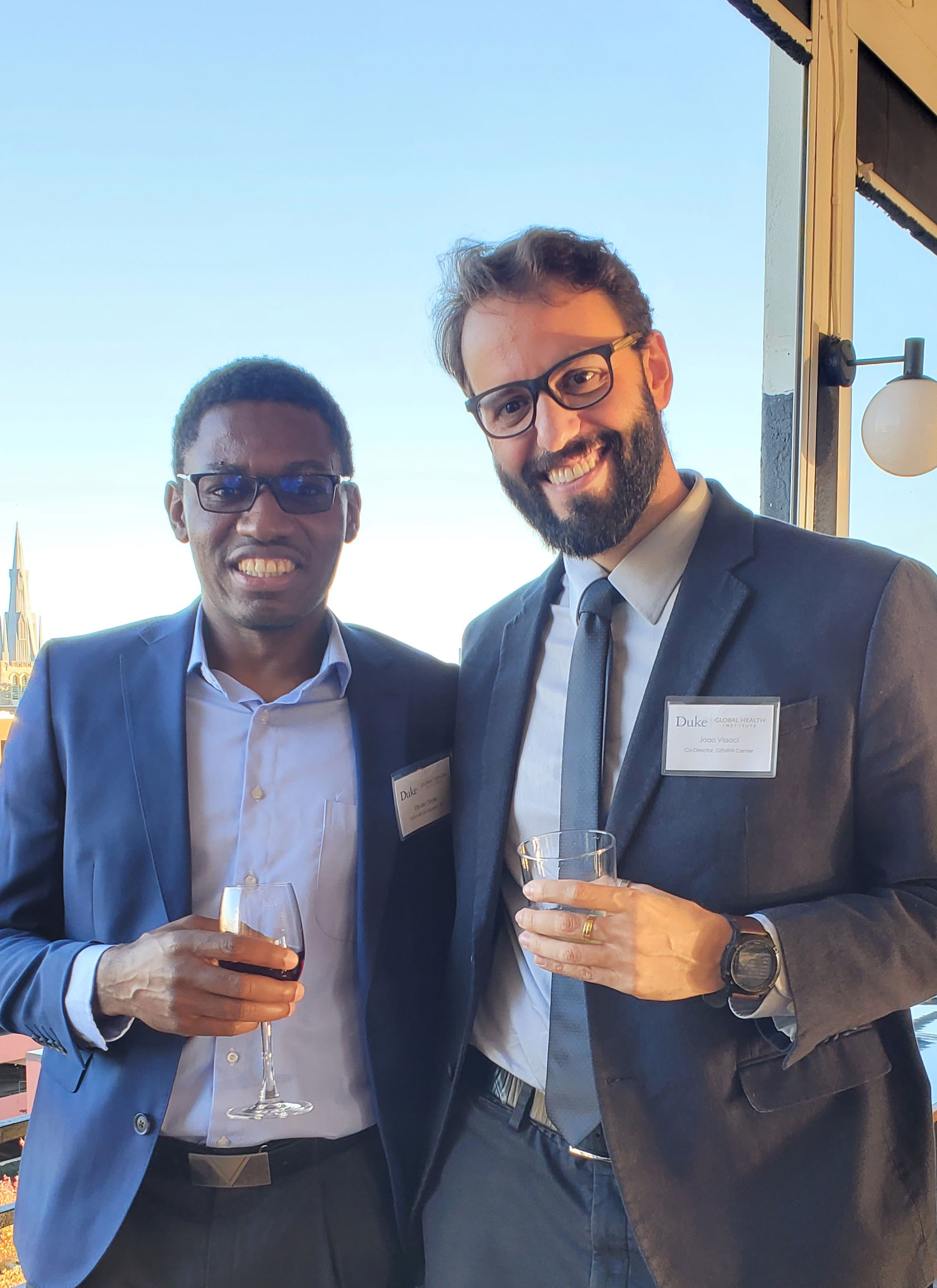 What makes for a good mentoring relationship?
What makes for a good mentoring relationship?
Vissoci: I believe a good partnership comes with respect, transparency, communication and empathy. Obale is very open and communicative, but he is also honest about his difficulties and challenges. We were able to respect each other's workload, stress and time and find the appropriate ways to collaborate. Obale was also respectful of my time, finding ways to interact with me through our GEMINI center meetings structure and peer to peer support. Obale was always very prepared to get the most of out our meetings with a set list of questions and updates. It all worked very well.
Obale: I would say things work well when like-minded persons work together. Commitment and looking out for one another is what I have observed. We communicate clearly but Joao is also patient with me. I really do appreciate that.
What were your expectations of the mentoring relationship?
Obale: I wanted a mentor who works in data science because that is a skillset I needed to grow. I also wanted someone who was understanding, patient, smart and nice. During the match process, I remember asking the education team if I still had to complete the other stages of the process if I had found the perfect match for myself. I knew that I had found a place I could grow when I had my first meeting with Dr Vissoci. I was right. I also know that every mentor expects hard work and a sense of commitment from their mentee. I am not perfect, but I am trying my best.
Vissoci: Obale is a unique person. He has amazing social skills and is eager to learn. I expected him to be involved with our research group and engage with the other students and faculty at GEMINI and that he would learn data science skills to conduct the proposed project. To do that, I felt that I needed to give him opportunities to find this knowledge and put his social skills to use. I put him to work with a postdoc that is working on developing our Global Repository for Injury Data and established a working group with other learners around the same topic. They would be able to share and support each other while we developed the activities.
What will you take away from the mentoring relationship?
Obale: Joao is like an elder brother to me now. Yes, he is busy, but he makes time to attend to me. Looking below the surface, I see someone with a good heart who wants the best for his mentee. In fact, as I told him in one of our meetings, should I be enrolled in a different university after this, I would still want him as a mentor.
You Have to Click
Second-year MS-GH student Kristen Stark and her mentor, Julian Hertz, M.D., an assistant research professor of global health, are studying ways to improve treatment of myocardial infarction in Moshi, Tanzania.
What made your mentoring relationship work?
 Stark: I think the best part of having Dr. Julian as a mentor is the mindset he has. He was very clear early on that he was just there to support me in my endeavors. I got to choose the direction I wanted to go, and what I wanted out of the partnership. He of course had tasks and work for me to do, but I got to choose what was interesting to me. It is really nice to have his full support as a young academic, instead of having a mentor who is dictating your path for you.
Stark: I think the best part of having Dr. Julian as a mentor is the mindset he has. He was very clear early on that he was just there to support me in my endeavors. I got to choose the direction I wanted to go, and what I wanted out of the partnership. He of course had tasks and work for me to do, but I got to choose what was interesting to me. It is really nice to have his full support as a young academic, instead of having a mentor who is dictating your path for you.
Hertz: Working with Kristen has been wonderful. I think this is in part because Kristen has done a great job of communicating her goals and expectations. This has helped me make sure I am supporting her to reach her own goals. Kristen and I have also done a good job of being flexible; there are times when we have needed to meet frequently and there are other times when Kristen has had other priorities like schoolwork and med school applications among others. We have both done a good job of adjusting our expectations when the other person is busy.
What did you expect from your mentor?
Stark: I don't think I came in with many expectations, I just hoped to get matched with someone who was kind and willing to give me the space to learn. I don't do well being micromanaged, so I got lucky that he was truly just there to support me when I needed it, but otherwise trusted me to figure things out on my own. As a research assistant I knew I was there to support his research projects, so I wanted to ensure that all the project tasks he needed help with were done and I could support the project in any way needed.
What should a student consider when picking a mentor?
Hertz: I think it’s important to have a mentor that you “click” with, in terms of personality and style. In terms of expectations, I haven’t really expected anything specific from Kristen other than her communicating her needs and goals to me. This research experience is really for her -not for me, and so my goal is to make sure I am helping her make the experience as useful for her as possible.
